Oct 2, 2014 -
Elizabeth Varon, Langbourne M. Williams Professor of American History at the University of Virginia and prize-winning author of several books on the American Civil War, was the speaker for the 19th Annual Carls-Schwerdfeger History Lectureship at Union University on October 2, 2014. Varon delivered two talks at Union, both of which were related to the Civil War.
Varon’s afternoon lecture was on “Reaping the Whirlwind: Disunion Rhetoric and the Coming of the Civil War.” She indicated that the specter of civil war in America was not something that suddenly emerged in 1861, but that it had haunted Americans since the founding of the republic. The key word in the rhetoric of those who imagined civil war in the antebellum years was “disunion.” It was a harsh political term that various groups used to attack and discredit their opponents. Proslavery Southerners, for example, labeled extreme abolitionists in the 1830s as disunionists, and later, Northern and Southern Democrats made the same accusation against the fledgling Republican Party. By the end of the 1850s, however, proslavery Southerners were defending disunion in the form of secession, which they saw as preferable to a Republican domination of the South, especially following Abraham Lincoln’s 1860 presidential election victory. Secessionists now believed that disunion was a blessing and that civil war would secure a Southern Confederacy that would become one of the most powerful nations in the world. Once the war was over, unreconstructed Southerners revived the use of disunion against the North by hurling the term at radical Republicans who favored African-American voting and civil rights. Varon noted that only in the late nineteenth century did the word fall out of use, when the North and South developed a cult of reconciliation between them. Some 75 people attended Varon’s afternoon presentation.
The topic of Varon’s evening presentation was “Legacies of Appomattox: Lee’s Surrender in History and Memory.” She argued that the signing of the surrender terms at Appomattox was an inherently political moment where Robert E. Lee and Ulysses S. Grant staked out diametrically opposed positions regarding the future of the republic. Lee sought the restoration of the South’s old social hierarchies minus the institution of slavery whose reincorporation he knew was impossible. For Southerners, Lee became a symbol of cautious defiance, someone who advocated restraint in the North’s plans for reunion. Grant, on the other hand, saw Lee’s surrender as a vindication of the justness of the North’s cause in the war. It was a victory for majority rule and a perpetual union. Yet Grant soon expressed disappointment at what he and his followers saw as President Andrew Johnson’s policy of excessive leniency in restoring power to unrepentant Southerners. He also criticized Lee for using the idea of restoration to justify Southern resistance to change. Varon likewise discussed the meaning of Appomattox for African-Americans. They viewed Lee’s surrender at Appomattox as a victory for racial justice and black freedom, and they saw the key role that black soldiers played in bringing about that surrender as a demonstration of patriotism, courage, and virtue. In the end, Varon pointed out, the hopes of African-Americans for social equality proved misplaced as the advocates of sectional reconciliation between North and South without racial equality ultimately prevailed. Varon spoke to an audience of more than 500 people.
In addition to lecturing, Varon visited Jackson’s Civil War Museum and Bemis Mill Village Museum, enjoyed a coffee time with history department faculty members, and attended a dinner in her honor in Union’s Chapman Dining Room. Following her evening address, Varon signed copies of her books Disunion! The Coming of the American Civil War, 1789-1859 and Appomattox: Victory, Defeat, and Freedom at the End of the Civil War.

Dr. Elizabeth Varon speaks on "Legacies of Appomattox: Lee's Surrender in History and Memory" in Union's G. M. Savage Memorial Chapel as the 18th Annual Carls-Schwerdfeger History Lecturer on October 2, 2014. Photo by MiKalla Cotton
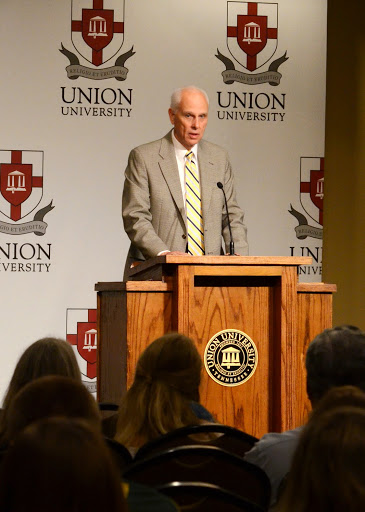
Dr. Stephen Carls introduces Dr. Elizabeth Varon at an afternoon lecture that she delivered on "Reaping the Whirlwind: Disunion Rhetoric and the Coming of the Civil War" in the Carl Grant Events Center on October 2, 2014. Photo by Meg Rushing
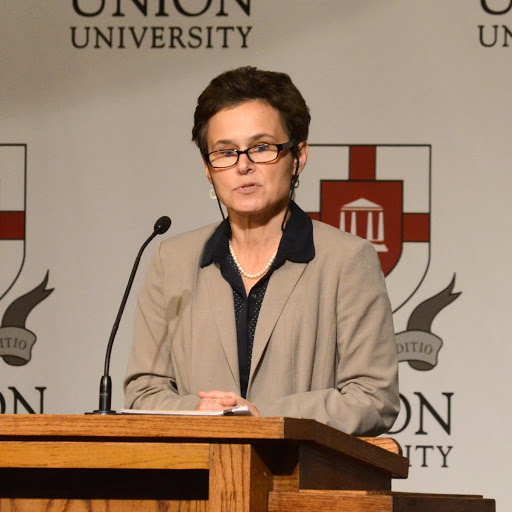
Award-winning Civil War historian Elizabeth Varon speaks on "Reaping the Whirlwind: Disunion Rhetoric and the Coming of the Civil War" at the 18th Annual Carls-Schwerdfeger History Lecture Series in the Carl Grant Events Center October 2, 2014. Photo by Meg Rushing
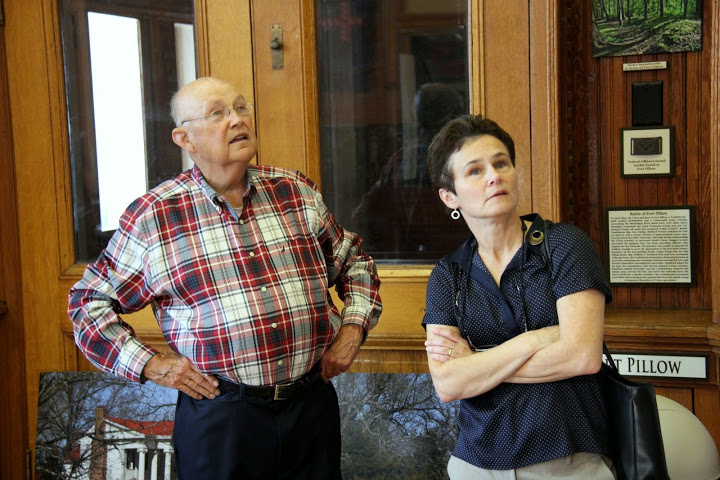
Harbert Alexander gives Dr. Elizabeth Varon a tour of the Civil War Museum at the Carnegie Library building in Jackson, Tennessee, on October 2, 2014.
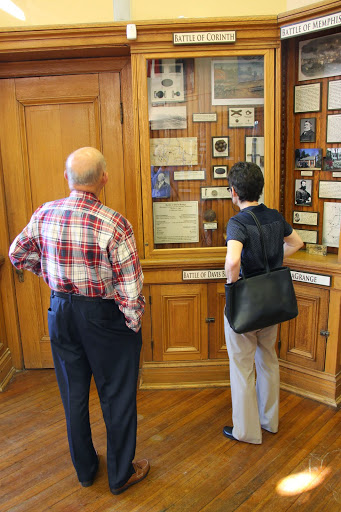
Harbert Alexander talks about the Battle of Corinth with Dr. Elizabeth Varon of the University of Virginia during a tour of the Civil War Museum in Jackson's Carnegie Library building on October 2, 2014.

Joel Jackson (left), chair of the Bemis Historical Society, shows a cross-section of a beam from the Bemis Mill to Harbert Alexander and Dr. Elizabeth Varon during a tour of the Bemis Mill Village Museum on October 2, 2014.
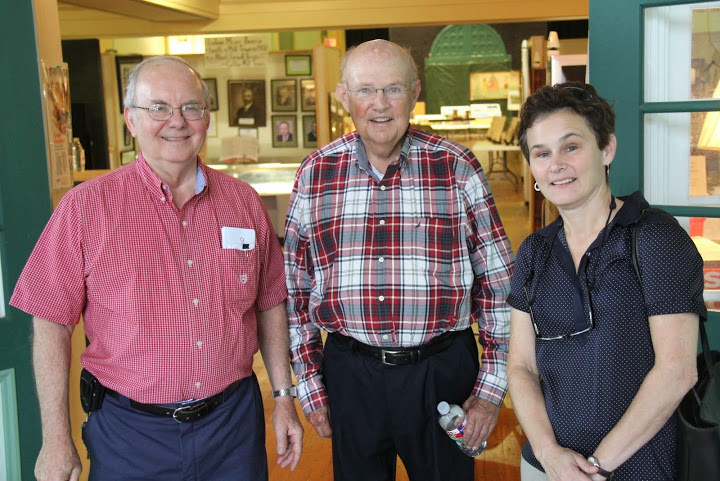
Joel Jackson (left to right), Harbert Alexander, and Dr. Elizabeth Varon stand together at the end of a tour of the Bemis Mill Village Museum on October 2, 2014.
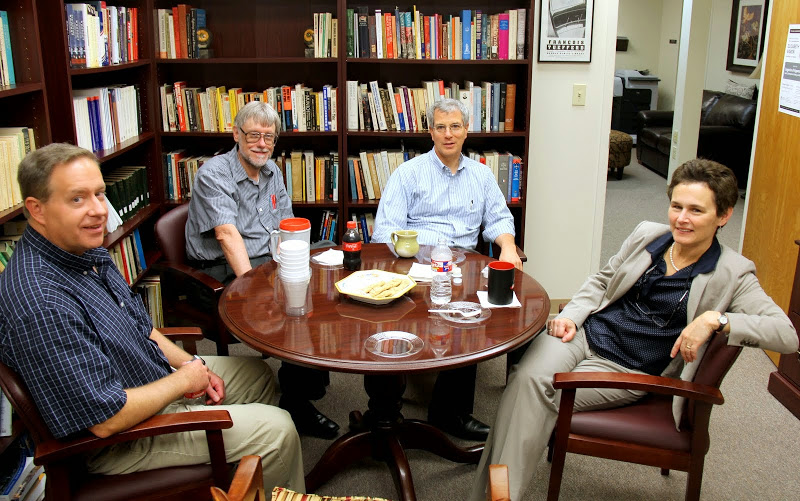
Dr. Henry Allen (left to right), Dr. Terry Lindley, and Dr. David Thomas of Union's history department share refreshments and conversation with Dr. Elizabeth Varon, the Carls-Schwerdfeger History Lecturer, on October 2, 2014.
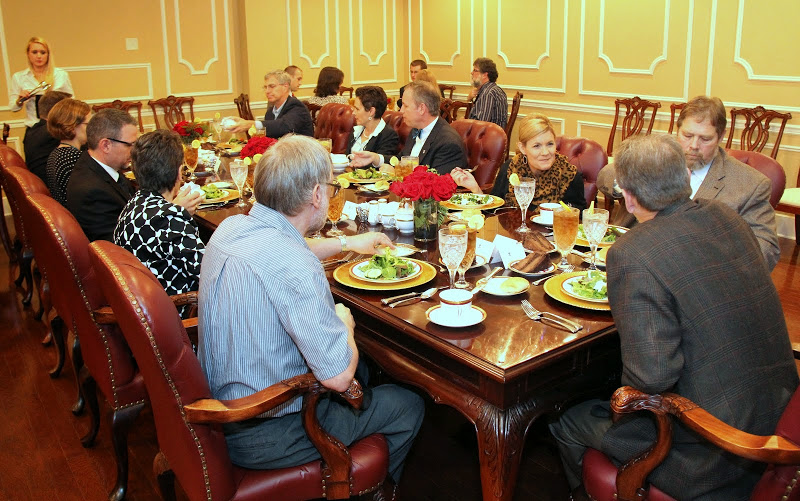
Attendees at a dinner in honor of award-winning Civil War historian Elizabeth Varon enjoy their meal together in the Chapman Dining Room on October 2, 2014. They are: (starting on the left front and going clockwise) Dr. Terry Lindley, Dr. Alice-Catherine Carls (back to camera), Dr. Keith Bates, Dr. Margaret Lewis of the University of Tennessee at Martin, Dr. Henry Allen (at far end of table on the left side), Dr. David Thomas, Dr. Elizabeth Varon, Dr. Samuel W. "Dub" Oliver, Susie Oliver, Dr. Ben Mitchell, and Dr. John Netland (back to camera).
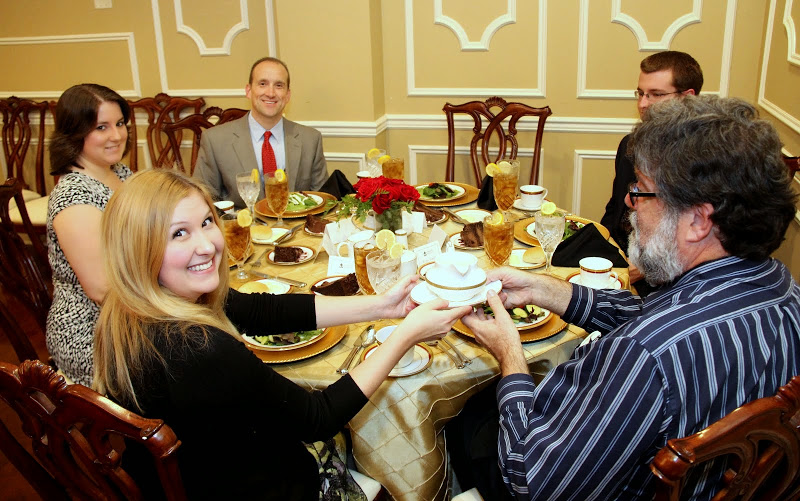
Attendees at the dinner in honor of Dr. Elizabeth Varon, the 2014 Carls-Schwerdfeger History Lecturer, enjoy their time together. They are (starting at the front left and going clockwise) Hannah Jones, Faith Bagley, Don Roe, Cameron White, and Roger Stanley.
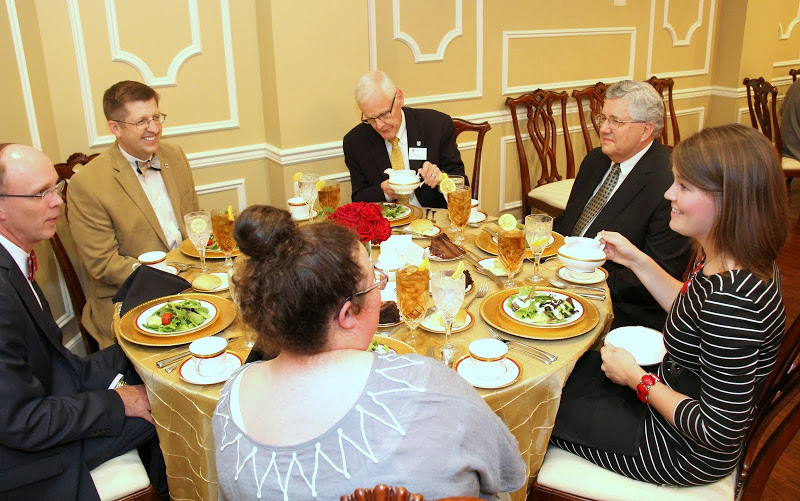
Attendees at a dinner in honor of Dr. Elizabeth Varon of the University of Virginia enjoy their time together on October 2, 2014. They are: (starting on the left and going clockwise) Robert Briley, Dr. Ray Van Neste, Dr. James Patterson, Dr. Michael McMahan, Sarah Carroll, and Shelby Pace (back to camera).
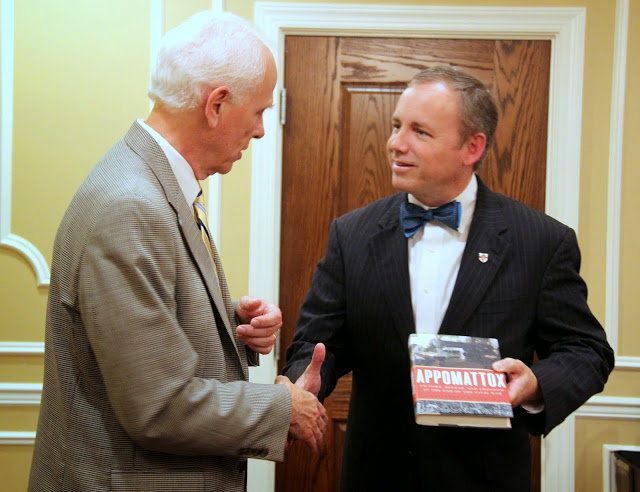
Dr. Stephen Carls (left) presents a book written by Dr. Elizabeth Varon to Union University President Samuel W. "Dub" Oliver at a dinner in honor of Varon on October 2, 2014.
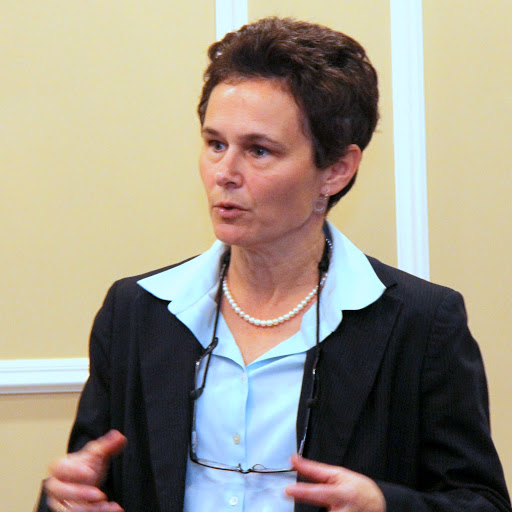
Dr. Elizabeth Varon, the 2014 Carls-Schwerdfeger History Lecturer, responds a question during a question and answer time at a dinner in her honor on October 2, 2014.
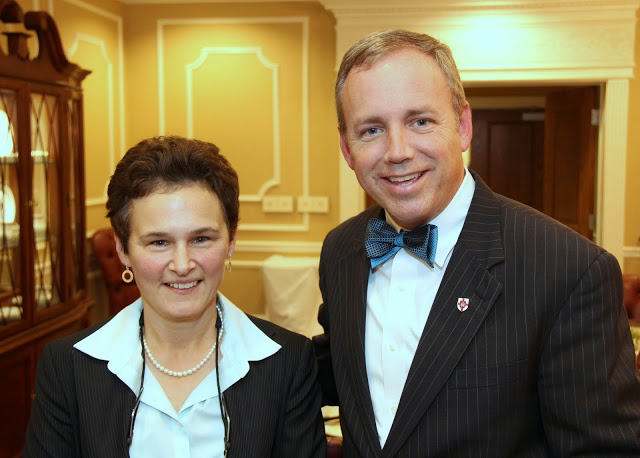
Award-winning Civil War historian Elizabeth Varon stands with Union University President Samuel W. "Dub" Oliver at a dinner in her honor in the Chapman Dining Room on October 2, 2014.
